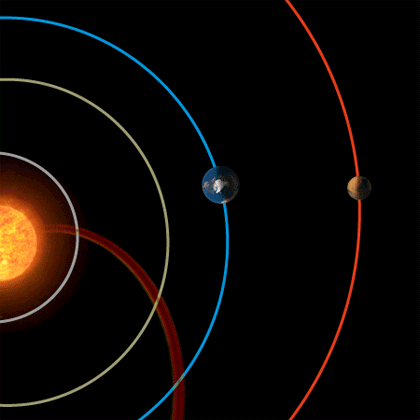Press Release 01/2012 - March 9, 2012
Oxygen loss from Earth and Mars caused by same Solar wind impulse
Magnetic shield protects Earth.
For the first time scientists of the Max-Planck-Institute for Solar System Research (MPS) discovered that the amount of oxygen ions leaving the Earth and Mars atmospheres is enhanced when a so-called co-rotating interaction region of the solar wind passes by the planets. The study is based on data of the Mars Express and Cluster spacecraft of the European space agency ESA with instrumentation partly built by MPS. A direct comparison of the oxygen loss rates was possible since in January 2008 the Sun, Earth and Mars were aligned and a fast solar wind stream reached both planets in sequence.
"The loss rate of oxygen varies by a factor 100 during the passage of the co-rotating interaction region depending on different factors as solar wind pressure and solar UV radiation", says Dr. Yong Wei of MPS who did lead the study. "If Earth would not be protected by the magnetosphere the loss of oxygen would be much stronger and could devastate life on Earth. Over a timespan of many million years Earth atmosphere would look similar to what we see at Mars today
", reports Dr. Markus Fränz of MPS who significantly contributed to the study.
Now the team is planning to extend the study to Venus since a similar instrumentation is mounted on the European Venus Express spacraft currently orbiting our second neighbor in space.

|
Figure 1: Sketch showing a co-rotating solar wind structure passing by Earth and Mars and extraction of ions from the planetary atmospheres.
|
(Credits: ESA)
|
The strong magnetic field of Earth acts as a protecting shield against solar storms while at Mars only remnants of a magnetic field exist today which may have protected the planet many billion years ago. Venus on the other hand seems not to have any traces of a magnetic field. Energetic ions forming solar storms are deflected by the Earth magnetic field at large distance from our planet while they interact directly with the upper atmospheres of Mars and Venus. This causes an erosion process and a loss of oxygen and hydrogen ions into space. These two ion types do escape easier than other ions because they can absorb more energy from the solar ultra-violet radiation. At Earth such a loss has also been observed for some years but here the loss is caused by electrical currents in the ionized upper atmosphere intensified by solar wind pressure pulses onto the magnetosphere. Recently it was even suggested that this loss may be higher than for Mars or Venus. But the present study shows that the magnetic field lowers the loss rate.
Earth, Mars and Venus were formed at the same period of solar system evolution but evolved very differently. While Earth has a dense water-rich atmosphere and a magnetic field, Mars atmosphere is water-poor and thin, while Venus atmosphere is dense but almost water-less.
Original Publicatioon
Wei et al.:
Enhanced atmospheric oxygen outflow on Earth and Mars driven by a corotating interaction region
JGR, 117, doi:10.1029/2011JA017340, 2012
 JGR publication
JGR publication
Additional Information
 ESA press release
ESA press release
Contact
Dr. Markus Fränz
Max Planck Institute for Solar System Research
Max-Planck-Straße 2
37191 Katlenburg-Lindau
Tel: 05556 979 441
Email: fraenz mps.mpg.de
mps.mpg.de
Dr. Yong Wei
Max Planck Institute for Solar System Research
Max-Planck-Straße 2
37191 Katlenburg-Lindau
Tel: 05556 979 221
Email: wei mps.mpg.de
mps.mpg.de
Dr. Norbert Krupp
Presse- und Öffentlichkeitsarbeit
Max Planck Institute for Solar System Research
Max-Planck-Straße 2
37191 Katlenburg-Lindau
Tel: 05556 979 154
Email: Krupp mps.mpg.de
mps.mpg.de
